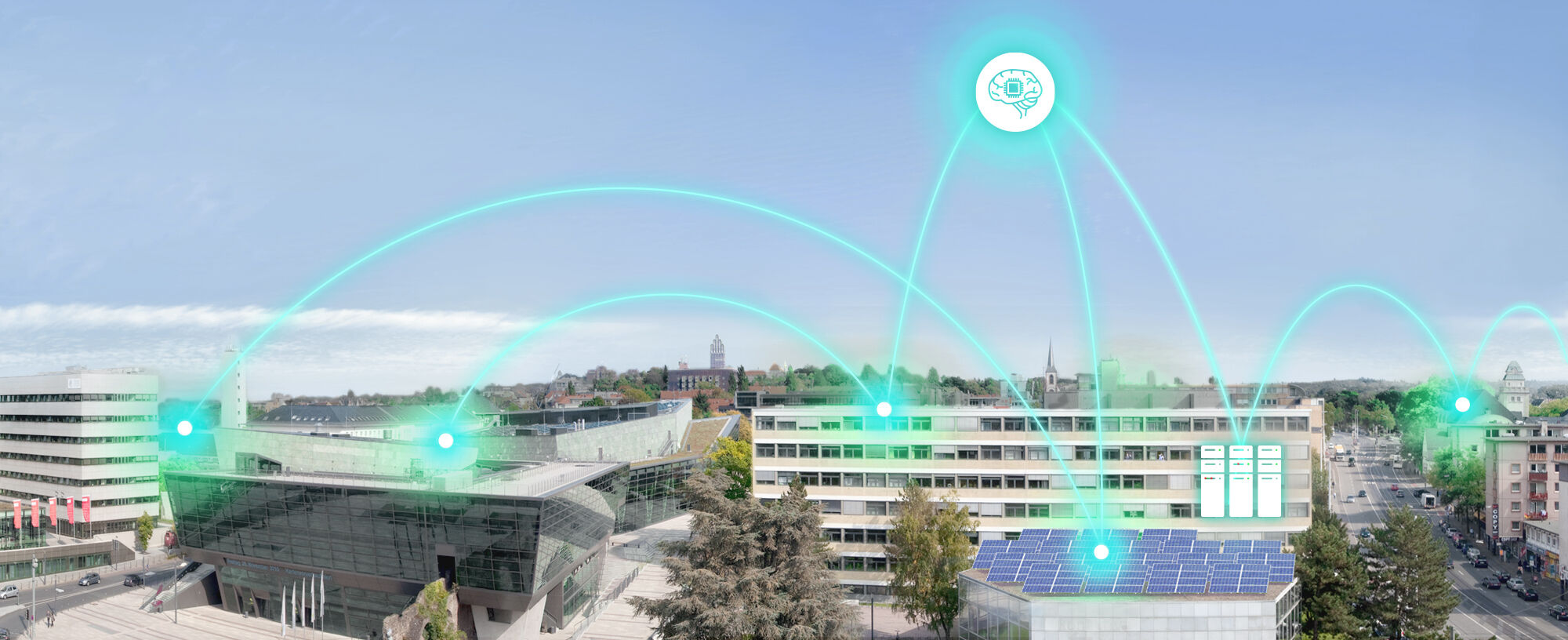Student: Ruben Chacon
Supervisor: Tobias Gebhard
Time period: 05/22/2023 - 07/27/2024
Type: Master Thesis
The topology of underground electrical distribution infrastructure is often not publicly available because it may contain sensitive information. However, for researchers it is valuable to work with real (or realistic) grid models/data, e.g. to study new optimization algorithms or conduct power flow calculations. Therefore, there is a need for methods that are able to generate synthetic grids in an automated way. For this, publicly available data like GIS (geographic information system) data from OpenStreetMap (containing overhead power lines, street courses, building locations and types…) as well as statistical consumption data can be used.
Student: Sinan Bilgin
Supervisor: Tobias Gebhard
Time period: 03/11/2024 - 09/12/2024
Type: Master Thesis
Student: Oliver-Maximilian Klein
Supervisor: Hans Stenglein
Time period: 05/27/2024 - 11/04/2024
Type: Bachelor Thesis
Diese Arbeit verfolgt das Ziel, eine praxisnahe Untersuchung zur Entwicklung und Implementierung eines solchen Temperatursensor-Netzwerkes und seiner Netzwerkanbindung in Innenräumen durchzuführen. Die Sensorknoten kommunizieren dabei drahtlos über einen ESP32 Microcontroller, der die Messdaten der Raumtemperaturen in die zentrale InfluxDB1.x Datenbank überträgt. Die dafür benötigte Schnittstelle wird in Python programmiert. Des Weiteren wird untersucht, inwieweit Zwischenknoten zur Datenweitergabe und -vorverarbeitung von Nutzen oder gar von Notwendigkeit sein können. Das betrachtete Gesamtsystem soll dabei einfach skalierbar sein und sich problemlos auf mehrere Etagen, Räume, Gebäude sowie über mehrere Quartiere hinweg ausdehnen lassen.
Student: Niyu Tong
Supervisor: Andreas Bott
Time period: 04/22/2024 - 09/25/2024
Type: Bachelor Thesis
Design and implementation of evaluation algorithms for optimizing the Preload Loss Test (PLT)
Student: Pedro Lopes Ferraz
Supervisor: Carolin Ayasse
Time period: 05/13/2024 - 11/11/2024
Type: Master Thesis
Energy-related data is of great importance as an input to various models that are crucial for a successful energy transition. For instance, the Municipal Heat Planning Law in Germany requires all municipalities in Germany to create a municipal heat plan. The creation of this plan necessitates a wide range of data, which includes data on the heating demand of buildings or the utilized heat-generating system in buildings. However, this data is subject to strict data protection regulations, and the owners of this data, typically energy supply companies, are unable to share it with modelers who require it as input for their models to create such municipal heat plans. To address this issue of restricted data sharing, privacy-preserving models can be employed. These models allow the original data owner to retain control of the data while enabling the retrieval of data via an interface that does not permit the identification of personal information. The method to which this interface is subject must be carefully developed so that no conclusions can be drawn about personal data and at the same time the data obtained is as useful as possible. This master thesis should investigate existing data preservation models such as differential privacy. Based on the findings in the literature, a model for a data preservation model which allows the exchange of personal data in the heat sector (e.g., gas consumption data, used heat generating unit, maximum power of heat generating unit) should be proposed. The developed model should then be tested and demonstrated using gas consumption data of approximately 100 multi-family houses. The developed model should not allow any re-identification, even when additional data sources, such as the data provided by Wärmeatlas Hessen, or other publicly available data, are taken into account.
Student: Luca Okubo Baudenbacher
Supervisor: Benedikt Grüger
Time period: 05/13/2024 - 11/10/2024
Type: Master Thesis
This thesis studies a physics-inspired anomaly detection algorithm to identify the source of forced oscillations in transmission grids.
Student: Raghul Babu
Supervisor: Sara Mollaeivaneghi, Carolin Ayasse
Time period: 01/05/2024 - 10/31/2024
Type: Master Thesis
The project will focus on expanding the understanding of how different parameters impact the economic and environmental viability of flexibility in telecommunications companies' central offices. By determining the optimal settings for these parameters, the company can better plan for future infrastructure investments and operational strategies, specifically, decide on how many resources shall be assigned to load flexibility realization. The scope will include the analysis of parameters such as electricity prices, self-generation share, battery capacity, etc. The work is conducted based on data from a large German telco company. , Python, good programming skills, Optimization, Energy Management and Markets, Literature Studies, Numerical Algorithm, Written in English
Student: Benjamin Seeger
Supervisor: Julia Barbosa
Time period: 11/01/2023 - 02/01/2024
Type: Project Seminars Bachelor
Local electricity markets are a promising approach to foster the integration of renewable energy sources. These markets give priority to consuming electricity in close proximity to its generation, thereby alleviating the strain on the grid infrastructure. However, considering these local electricity markets as island systems is an unreasonable assumption. First, the presence of pre-existing transmission grid networks enhances energy security across all regions. Second, many supplier agents have assets in different regions and thus their strategies may not only be based on the outcome of a single market.
To understand how the coupling between local electricity markets affects the strategic behavior of supplier agents in such a market structure, this work shall propose a Nash-Cournot competition model that accounts for the transmission grid constraints.
Student: Jean-Marc Debarnot
Supervisor: Sina Hajikazemi
Time period: 06/03/2024 - 11/18/2024
Type: Master Thesis
Access to reliable energy is essential for socio-economic development and for mitigating the effects of climate change. In Sub-Saharan Africa, reliable energy access and climate change are pressing issues, exacerbated by poverty and unequal distribution of resources. This thesis investigates techno-economic strategies to optimize a centralized energy system for the western region of Sub-Saharan Africa, focusing on the most promising locations for electricity generation and consumption. By focusing on a techno-economic optimization approach, it seeks to identify practical solutions that can be implemented by private and public sector actors to promote inclusive growth and energy sustainability in the region.
There are many uncertainties to be considered in the energy planning process. These uncertainties range from prices to weather conditions and so on. One of the approaches to deal with these kinds of uncertainties is adaptive robust optimization, which has attracted a lot of attention in the energy research community in recent years. Another goal of this research is to adapt this method to the problem and compare the results with the deterministic version.



